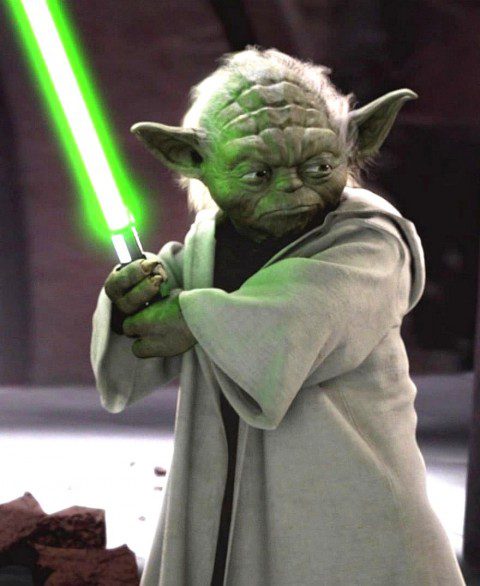A half century under Soviet occupation and politically correct anti-religious indoctrination in its schools has left one of the most historically Christian nations in Europe divided — with half of the population claiming to be atheists or unsure what they believe.
And 15,070 claim “the Force” is with them — they are practicing Jedi knights.

In the March 2011 census of the Czech Republic’s 10 million citizens, 15,070 clicked off a box on the form claiming to be the fictional mystic warriors of filmmaker George Lucas’ six-film series Star Wars. Another 707,649 said they believe in God but do not belong to any church.
However, it’s the Jedi knights that have officials scratching their heads.
“Fifteen thousand adherents, which is the size of a small town, is not a negligible social phenomenon,” Stanislav Drapal, deputy head of the statistical office, told reporters. In Prague, 3,977 — or 0.31 per cent of the capital’s population — said they follow the faith taught in the film by the Sesame Street-inspired puppet, Yoda, who teaches Luke Skywalker to levitate his space craft.
In the films, the Jedi wield light sabers and are mystical guardians of the beleaguered Galactic Republic — with enhanced mind powers that allow them to harness “The Force” to control inanimate objects and influence others. In the original movie, Jedi warrior Obi-wan Kenobi, quietly uses “the Force” to evade a police checkpoint. Quietly, he tells an imperial storm-trooper, “These aren’t the ‘droids you’re looking for,” to which the storm-trooper responds, “These aren’t the ‘droids we’re looking for,” and allows Kenobi, Skywalker and androids C3P0 and R2D2 to continue on their mission to save the universe.

“We included this option (in the census form) despite a fierce debate over whether it’s serious or not. But it’s not up to statisticians to say what is or is not a religion,” said Drapal, noting almost five million Czechs left the religion column empty. “If we add the 3.6 million citizens who said they were not religious at all, it looks as if Czech citizens ignored the issue or as if they really had no relationship to faith and religion.”
So, are these Czechs convinced they can levitate X-wing fighter aircraft out of swamps — and that “the Force” is, indeed, with them?
Not at all, writes Religious News Service reporter Jack Jenkins in a Christian Century magazine report “Jedis and Pastafarians: Real religion or just a joke?”
Pastafarians claim to worship the “Flying Spaghetti Monster,” which Jenkins calls “the noodly appendaged deity of a fictitious religion called ‘Pastafarianism’ that’s popular among some atheists and agnostics. Its invention has “spurred a discussion among atheists about the usefulness of so-called ‘joke’ or ‘invented’ religions in the non-religious movement.” In fact, Pastafarianism was founded in 2005 when physics student Bobby Henderson sent a letter to a Kansas school board satirically critiquing the theory of intelligent design by citing “evidence that a Flying Spaghetti Monster created the universe.”
“The joke grew into something of a cultural phenomenon for atheists, especially online and on college campuses,” writes Jenkins. “Adherents brandish Pastafarian bumper stickers (‘He Boiled For Your Sins’), clutch Flying Spaghetti Monster holy books (the ‘Loose Canon’) and even celebrate holidays such as “Ramendan” (a parody of Muslim Ramadan), all in the spirit of poking fun at religion.”
Carole Cusack, professor of religious studies at the University of Sydney, Australia, and author of the book Invented Religions, notes that some view the sarcasm in different ways. “The first is as fellow warriors in the ongoing campaign to make religion look ridiculous,” she told Jenkins. “The second is as a nuisance, muddying the waters.”
She notes that a half-million people listed “Jedi Knight” as a tongue-in-cheek religious affiliation on 2001 census forms in Australia, Canada, New Zealand and the United Kingdom.
“As Australia readied for its 2011 census, however, some atheists called for an end to the wisecracking,” writes Jenkins. “Arguing that many who listed their religion as ‘Jedi’ were just atheists making a joke, the Atheist Foundation of Australia launched a campaign urging nonbelievers to “Mark “No Religion” and take religion out of politics.’ Their reasoning, they said, was practical since ‘Jedi’ gets counted as ‘not defined’ instead of ‘no religion,’ which only serves to undercount the nonreligious population.”
“It was funny to write Jedi once, now it is a serious mistake to do so,” the organization wrote on its website.

“When (religious) people try to dominate public discourse and dominate the political landscape,” one source told Jenkins, “sometimes the humor you find in things like the Flying Spaghetti Monster is a very subtle and powerful way of pushing back.”
Similarly, getting national census officials to list “Jedi knight” as a religious choice is a grassroots movement that was initiated in 2001 for residents of a number of English-speaking countries, urging them to record their religion as “Jedi” or “Jedi Knight,” writes Cusack in Invented Religions. She speculates that the majority of self-reported Jedi knights claimed the religion for their own amusement, to poke fun at the government or to protest.
No country has acknowledged Jediism as an actual religion although Britain, Australia, Canada, New Zealand and now the Czech Republic have given in to demands that it be included on census forms. In Australia more than 70,000 people claimed to be Jedi knights in the 2001 census, 21,000 in Canada and 53,000 in New Zealand. In England and Wales, 390,127 people (almost 0.8 percent of the census) stated their religion as Jedi on their 2001 Census forms, surpassing Sikhism, Judaism, and Buddhism, and making it the fourth largest reported religion.
In the 2001 Census 2.6% of the population of the British city of Brighton claimed to be Jedi knights. In June 2005, Jamie Reed, newly-elected Labour Member of Parliament for Copeland in Cumbria, declared himself to be the first Jedi Member of Parliament during his maiden speech. His office later told the press that the claim was meant to be a joke.
On November 16, 2006, two self-proclaimed Jedi knights delivered a protest letter to the United Nations regarding the UN’s International Day for Tolerance. They requested that it be renamed the “UN Interstellar Day of Tolerance” and cited the thousands of Jedi in recent census results.
So, is the Czech Republic filled with Obi-wan worshipers?
No. With the country’s tumultuous history, religion has become a sensitive topic for many Czechs. Petr Mucha, a Religious Studies professor at New York University in Prague, explained to Jessica Shim, writing for the Czech news site Cesky Rozhlas:
“Most people after the fall of communism got some sort of interest in religion. However, due to the communist education in the past, most of them have wrong knowledge, or less knowledge about the religion. There are a lot of misunderstandings about religious belief, about the religious history and it creates a big problem in communication about religion.”

In a 2007 opinion poll, forty-eight percent of respondents polled identified themselves as atheists, one of the highest percentages in the world. But Marv Slovacek, says that “atheist” is perhaps not the best way to describe how Czechs feel about religion:
“The term atheism is perhaps overused. I don’t think most people are strong in their belief that there is no God. But they do not have an active belief in God. They believe that there is something. And I think we are seeing more and more people turn to that. And they are seeking for some answers and reasons, the purpose of life. And so we are finding more and more people talking to us, wondering, looking for answers and they don’t know where to find them.”
One missionary who has worked in the Czech Republic says most Czechs don’t like to discuss religion. “We get everything, everything you could imagine,” said Alex Trost. “We get people who don’t say anything, and we get people who really stop and talk to us for a long time, but in the end have no interest, and we also have people who want to meet and become great friends. That range of people is great. It’s tons of different reactions.”
But still the dominating response is scepticism, says another missionary Tomas Uher, who previously worked at Britain’s Cambridge University.
“The general response is usually suspicion. Suspicion? Yeah, suspicion is probably the word that would summarize the reaction of most,” he said of Czechs. “They are more reserved, they are not as hungry as I found the Chinese students were at Cambridge, they don’t come after us and say we’ve heard something about Jesus can you tell us more about him, no. That’s definitely not what’s happening here.
“I’ve heard it said that for a student to become a Christian in the Czech Republic, it takes one and a half year or up to two years. I can perfectly agree with that. I think it takes a lot of friendship, lot of investment.
“Friendship is the main vehicle which helps that.”


